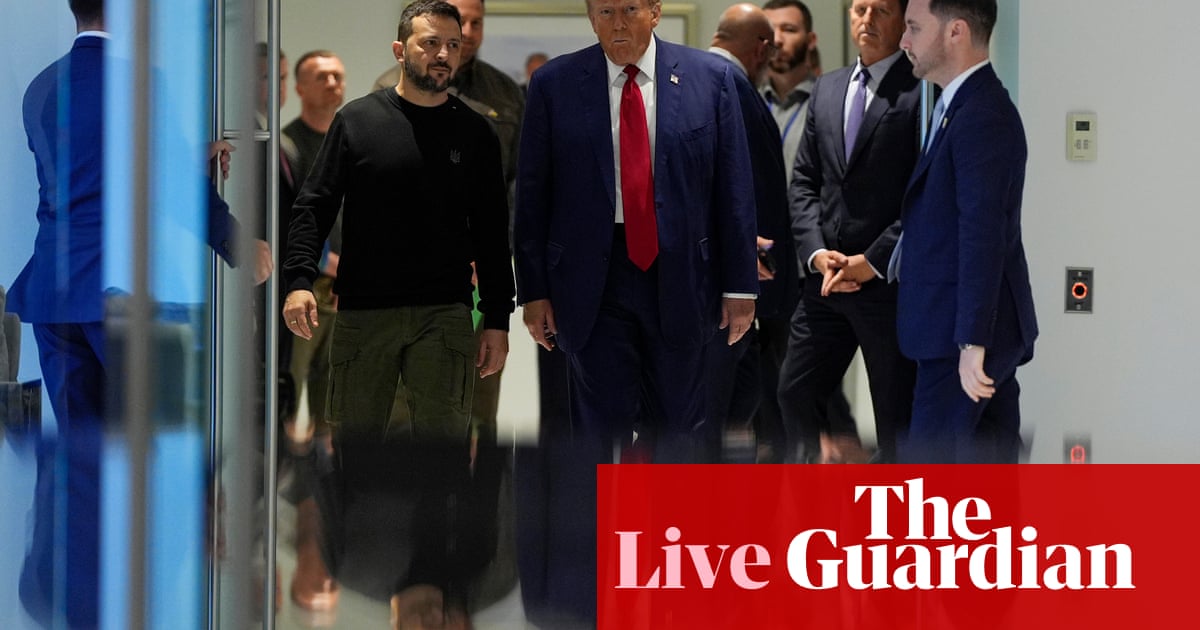Trump says Zelenskyy to visit White House and is set to sign rare earth minerals deal
Donald Trump has said that Volodymyr Zelenskyy is likely to visit the White House on Friday to sign a rare earth minerals deal to pay for US military aid to defend against Russia’s full-scale invasion.
The announcement followed days of negotiations between the US and Ukraine in which Zelenskyy alleged the US was pressuring him to sign a deal worth more than $500bn that would force “10 generations” of Ukrainians to pay it back.
Media outlets reported late on Tuesday that the terms of an agreement had been reached.
“I hear that he’s coming on Friday,” Trump told reporters in the Oval Office. “Certainly it’s OK with me if he’d like to. And he would like to sign it together with me. And I understand that’s a big deal, very big deal.”
According to the Financial Times, which first reported the deal, the new terms of the deal did not include the onerous demands for a right to $500bn in potential revenue from exploiting the resources, which include rare earth metals and Ukrainian oil and gas resources.
“Without the United States and its money and its military equipment, this war would have been over in a very short period of time”, Trump said on Tuesday. He also said “some form of peacekeeping” in Ukraine would be required after any peace deal.
In other developments”
-
Emmanuel Macron is due to brief European leaders following his meeting with Donald Trump at 9am GMT. As part of a continued Europe-wide push on security, defence ministers from across the continent are expected to meet in London on Sunday for a hastily arranged summit.
-
Calls are growing for hundreds of billions in Russian government wealth frozen in the international banking system to be used in full for Ukraine’s defence. Europe and the G7 have found ways to use interest from the financial assets to help Ukraine in the war, but the capital has remained locked up since the February 2022 invasion.
-
Ukraine received 500,000 artillery shells bought outside Europe in 2024 under an initiative run by the Czech Republic, said its prime minister, Petr Fiala.
-
Moscow has dismissed Donald Trump’s claim that Russia would accept European peacekeeping troops in Ukraine, Pjotr Sauer writes. Addressing reporters, Kremlin spokesperson Dmitry Peskov said the Kremlin had nothing to add to the foreign ministry’s position on the unacceptability of Nato peacekeepers in Ukraine.
-
The cost of reconstruction and recovery in Ukraine after three years of Russia’s full-scale invasion will be $524bn over the next decade, according to a report released by the Government of Ukraine, the World Bank Group, the European Commission, and the United Nations.
Key events
Russia’s foreign minister Sergei Lavrov is currently speaking at a press briefing in Qatar. We will bring you any key lines that emerge.
Citing the Marseille prosecutor, Reuters reports that two French nationals have admitted responsibility for an arson attack at the Russian consulate in the city on Monday.
Kremlin: expert level talks between US and Russia being prepared but no plan for Putin-Trump call
The Kremlin said on Wednesday that expert level talks between the US and Russia were being prepared. In his daily media briefing Kremlin spokesperson Dmitry Peskov said there were no current plans for Vladimir Putin and US president Donald Trump to speak directly on the phone.
The Kremlin said it declined to comment on any aspect of a proposed US-Ukraine deal allowing the US to extract rare minerals from Ukraine in lieu of payment for military support until there were official statements. Russia’s president on Monday evening offered to sell Russian rare earth minerals to US companies, including minerals from the Russian-occupied areas of Ukraine
Peskov also said no discussions had been held with China about the possibility of Chinese troops being deployed in a peacemaking role in Ukraine in the event of any deal.
In a statement Russia’s ministry of defence said that overnight air defences had shot down 185 Ukrainian drones. It also claimed that in the last 24 hours Russian troops had killed over 1,000 Ukrainian service personnel across the entire front. It has not been possible for journalists to independently verify the casualty figures being issued during the conflict.
Macron to brief European leaders about visit to Trump in Washington
France’s president Emmanuel Macron is holding a call to brief European leaders on the outcome of his visit to Washington to meet US president Donald Trump earlier this week.
Ukraine’s emergency services have issued images of first responders working at the site of an overnight Russian attack on Kryukivshchyna on the outskirts of Kyiv.
Authorities say Russia attacked Ukraine with nearly two hundred drones overnight. One person was reported killed by a drone attack on the wider Kyiv region.
Vladimir Rogov, a pro-Russian leader in Ukraine’s occupied Zaporizhzhia, has told Russian media outlet Tass that Russian troops have seized Skudne, which is on the border between Zaporizhzhia and Donetsk regions.
Suspilne, Ukraine’s state broadcaster, reports that workers are attempting to repair damage in Dnipropetrovsk region after what it described as “a massive attack” hit an energy facility.
Ukraine’s air defences shot down 110 of 177 drones launched by Russia in an overnight attack on Wednesday, the air force said in quotes carried by Reuters. The statement said that 66 other drones were “lost”, in reference to the military’s use of electronic warfare to redirect them.
Ukraine’s army chief, Oleksandr Syrskyi, said he discussed continued military support for Kyiv and battlefield developments with British Defence Chief Antony Radakin, according to a report from Reuters.
“Admiral Sir Antony Radakin once again assured me of the United Kingdom’s readiness to provide military assistance to the Ukrainian Defence Forces,” Syrskyi said in a statement on Facebook.
What are critical minerals and rare earth elements?

Damien Gayle
What are critical minerals?
Critical minerals are the metals and other raw materials needed for the production of hi-tech products, particularly those associated with the green energy transition, but also consumer electronics, artificial intelligence infrastructure and weapons.
As the world’s economy and technology transforms, the value of critical minerals has soared and geopolitical competition for access to them is rising. In 2023, the International Energy Agency (IEA) estimated that the market for energy transition minerals had reached £320bn in 2022, double its value five years earlier. And if countries fully implement their clean energy and climate pledges, demand is expected to more than double by 2030 and triple by 2040, the agency says.
What are rare earth elements?
Rare earth elements (REEs) are a subset of 17 critical minerals that are variously indispensable for mobile phones, electric vehicles, missile guidance systems and other electronics, industrial and energy applications.
Despite their name, most of the rare earth elements are not particularly rare, but their extraction and refining is fiendishly difficult – and environmentally highly destructive – meaning production is concentrated in very few places, mainly China.
REEs include europium, used in nuclear power station control rods; dysprosium, gandolinium and praseodymium, used in the magnets in your mobile phone; and gadolinium, holmium and ytterbium, used in lasers among other things.
What critical minerals does Ukraine have?
A 2022 article by the chair of Ukraine’s Association of Geologists, Hanna Liventseva, claimed her country contained about 5% of the world’s mineral resources, despite covering only 0.4% of the globe’s surface, thanks to a complex geology that takes in all three of the main components of the earth’s crust.
According to Ukraine’s own data, cited by Reuters, the country has deposits of 22 of the 34 minerals identified as critical by the EU, including rare earths such as lanthanum, cerium, neodymium, erbium and yttrium.
Before the outbreak of war with Russia, Ukraine was a key supplier of titanium, producing about 7% of global output in 2019, according to European Commission research. It also claimed 500,000 tons of lithium reserves, and one-fifth of the world’s graphite, a crucial component of nuclear power stations.
Trump says Zelenskyy to visit White House and is set to sign rare earth minerals deal
Donald Trump has said that Volodymyr Zelenskyy is likely to visit the White House on Friday to sign a rare earth minerals deal to pay for US military aid to defend against Russia’s full-scale invasion.
The announcement followed days of negotiations between the US and Ukraine in which Zelenskyy alleged the US was pressuring him to sign a deal worth more than $500bn that would force “10 generations” of Ukrainians to pay it back.
Media outlets reported late on Tuesday that the terms of an agreement had been reached.
“I hear that he’s coming on Friday,” Trump told reporters in the Oval Office. “Certainly it’s OK with me if he’d like to. And he would like to sign it together with me. And I understand that’s a big deal, very big deal.”
According to the Financial Times, which first reported the deal, the new terms of the deal did not include the onerous demands for a right to $500bn in potential revenue from exploiting the resources, which include rare earth metals and Ukrainian oil and gas resources.
“Without the United States and its money and its military equipment, this war would have been over in a very short period of time”, Trump said on Tuesday. He also said “some form of peacekeeping” in Ukraine would be required after any peace deal.
In other developments”
-
Emmanuel Macron is due to brief European leaders following his meeting with Donald Trump at 9am GMT. As part of a continued Europe-wide push on security, defence ministers from across the continent are expected to meet in London on Sunday for a hastily arranged summit.
-
Calls are growing for hundreds of billions in Russian government wealth frozen in the international banking system to be used in full for Ukraine’s defence. Europe and the G7 have found ways to use interest from the financial assets to help Ukraine in the war, but the capital has remained locked up since the February 2022 invasion.
-
Ukraine received 500,000 artillery shells bought outside Europe in 2024 under an initiative run by the Czech Republic, said its prime minister, Petr Fiala.
-
Moscow has dismissed Donald Trump’s claim that Russia would accept European peacekeeping troops in Ukraine, Pjotr Sauer writes. Addressing reporters, Kremlin spokesperson Dmitry Peskov said the Kremlin had nothing to add to the foreign ministry’s position on the unacceptability of Nato peacekeepers in Ukraine.
-
The cost of reconstruction and recovery in Ukraine after three years of Russia’s full-scale invasion will be $524bn over the next decade, according to a report released by the Government of Ukraine, the World Bank Group, the European Commission, and the United Nations.
Article by:Source: Martin Belam (now) and Tom Bryant (earlier)
















